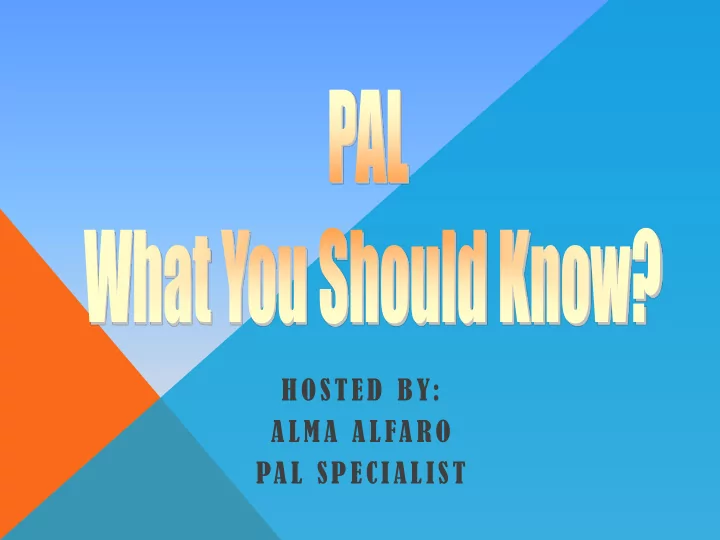

HOSTED BY: ALMA ALFARO PAL SPECIALIST
WHAT HAPPENS TO OLDER FOSTER YOUTH? ADOPTION RATES ARE LOWER FAMILY REUNIFICATION HAS NOT BEEN ACHIEVED
What is PAL? Preparation for Adult Living is a program whose purpose is to prepare youth for adult life when they leave foster care.
At what age does PAL Training start? PAL services must begin by the youth’s 16th birthday (or as soon as possible if the youth enters DFPS- paid substitute care after turning 16).
Who gets PAL Training Services? • Priority population that must be served is youth in DFPS-paid substitute care who are age 16 or older and likely to remain in foster care until at least age 18. • Youth in relative (non-paid) placement can also receive services if they will remain in care until 18.
What do youth do in PAL? Youth attend PAL Training that covers the following areas (30 Clock hours): • Health and safety • Housing and transportation • Job readiness • Financial management • Life decisions and responsibilities • Personal and social relationships Must complete PAL Training to be eligible for Transitional Living Allowance of $1000. Given to them when they transition (AGE OUT) from foster care. Must be working or going to school.
What is PAL Aftercare Services? PAL may provide services for youth who have aged out of foster care but have not yet reached age 21 in the form of: CASE MANAGEMENT & FINANCIAL ASSISTANCE
What does PAL Aftercare help with? Allowable expenditures include: • rent deposits; • rent payments; • utility deposits & utility payments (electric, gas, water); • Food (given grocery card); • residential housing deposits or payments for college dorms • financial compensation up to $200 per month to host homes ***$3000 Life time MAX up to age 21 ***Youth MUST have AGED OUT and be working or going to school to qualify for financial assistance.
Up to what age can a former foster youth get Medicaid? A youth must have AGED OUT at 18 in order to get Medicaid until 26 or if they are Legal Permanent Residents* until 21 (*LPRs must meet a 5 year rule to be eligible to qualify for Medicaid until 26).
What is a Tuition Waiver? A student is exempt from the payment of tuition and fees at any TEXAS public university or college if they were in care: •The day preceding the student's 18th birthday; •The day of the student's 14th birthday, if the student was also eligible for adoption on or after that day; •The day the student graduated from high school or received the equivalent of a high school diploma; •The day the student was adopted if that date is on or after September 1, 2009; •The day permanent managing conservatorship of the student was grant to an individual other than the student's parent, if that date is on or after September 1, 2009; or •If the student enrolls in a dual credit course or other course which a high -school student may earn joint high school and college credit, and is in conservatorship on the day of enrollment. **The student must enroll as an undergraduate not later than the student's 25th birthday.
What is E.T.V.? Education & Training Voucher Program provides postsecondary education funds to • youth that AGED OUT of foster care (were not living with parent prior to aging out) • or who were adopted or entered into a Permanency Care Assistance agreement after turning age 16. • or foster care youth enrolled in dual enrollment courses The ETV program serves youth age 16 up to the month of their 23rd birthday and is based on the students cost of attendance. * Eligible young adults may receive up to $5,000 in financial assistance per year.
How long can a youth stay in Foster Care? Youth can remain in care until 21 as long as they are: • Working part-time (80 hours a month) or • Attending high school or college (part-time) OR • Volunteering at least 15 hours a week. ( until 22 if still in high school-Special Needs youth).
Circles of Support Circles les of Suppor ort t (COS) S) are conferen ences es (meetings tings) ) held to help older r youth, , age 16 o or older • develop a TRANSITION NSITION PLAN N for moving from foster care to adulthood; • Connect with supportive and caring adults who can help the youth after he/she leaves foster care
THANK YOU!!! PAL ALMA ALFARO (956) 369-4586 4586 ALMA.ALFARO@DFPS.STATE.TX.US
Recommend
More recommend